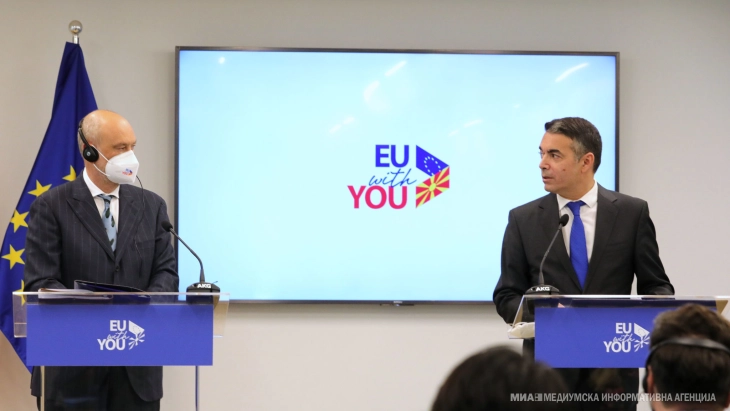Dimitrov: Better to be surprised by good news, we’ve had enough disappointments

Skopje, 20 October 2021 (MIA) – It’s better to be surprised by good news because we’ve had enough disappointments and false hope. It’s important that European Commission President Ursula von der Leyen and the European Council President Charles Michel are showing interest and making efforts at this stage, which gives us hope for a breakthrough, although we have to be careful with our hopes and expectations. It’s time to show responsibility and think about where we want the region to be five, ten years from now, Deputy PM for European Affairs Nikola Dimitrov told a joint press conference with EU Ambassador to North Macedonia David Geer on Wednesday, during which they presented the European Commission’s progress report on North Macedonia.
“Reports on North Macedonia have been positive, with a few exceptions, since 2009. It’s now 2021 and it’s not a coincidence that the word credibility was mentioned so often yesterday by Commissioner Várhelyi and MEPs at the AFET. We keep saying that the stakes are high for us, the region and the EU. Positive reports but no action affect the value of these reports. Due to the fact that we’re currently holding local elections, the question of whether the EU will deliver when Western Balkan countries already have, impacts whether pro-European policies will be valued by voters,” Dimitrov said.
He stressed that stakeholders have a joint mission to make pro-European policies more convincing in the eyes of Western Balkan citizens. North Macedonia, Dimitrov added, as well as the EU, both have that responsibility because when the country delivers and the EU doesn’t the efforts that have been put in that pro-European mission are challenged.
According to Dimitrov, if a breakthrough isn’t achieved during the Slovenian presidency, maybe something can be done during the French one.
“EU makes decisions based on consensus, so we need all 27 member states. They said ‘yes’ in March 2020, but one of them, our neighbor Bulgaria, has been blocking the adoption of the negotiating framework and the first intergovernmental conference. This impacts us, it impacts the friendship between North Macedonia and Bulgaria and it impacts EU’s policies in the region. So it’s time to take responsibility and think about where we want the region to be in five or ten years,” Dimitrov noted.
He told reporters that Bulgaria’s veto diminishes the purpose of the European Commission’s report on reform progress.
“When a member state is blocking the process due to issues that aren’t closely related to the Copenhagen criteria and the EC is saying that it’s time to make progress, that impacts the relevancy of these recommendations,” Dimitrov underlined.
In regard to criticism expressed in the report of the election law, OSCE/ODIHR recommendations, fight against financial crime, public administration, etc. and what will be done to improve the situation, he said that the main question is whether there will be political commitment, as well as enthusiasm and motivation in the administration and experts to move forward without the satisfaction of recognition.
“These are complicated issues. I agree with Ambassador Geer who said that reforms are for us. The accession process doesn’t perform miracles, but offers opportunities,” Dimitrov stressed.
According to him, the process aims to make North Macedonia a more European, more democratic, economically prosperous country with a better environment, fairer conditions for competitiveness, a more just country in which the law applies equally to all.
“The process is more important that the end result. However, for it to work, both sides have to deliver on promises. It’s obvious that the EC and 26 member states say that North Macedonia has delivered on everything that was asked f it. A lot of them are saying much more. So, by not delivering on promises, the EU diminishes the importance of the accession process as a reform tool and it’s up to us to see whether we can move forward without it,” Dimitrov concluded.







